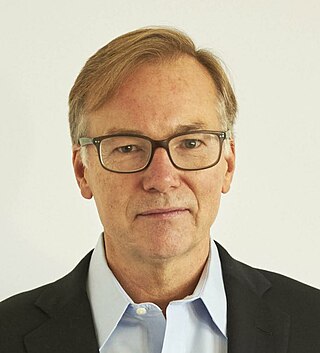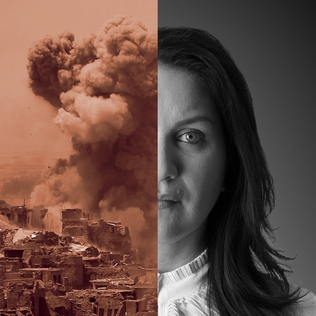
The Pulitzer Prize is an award administered by Columbia University for achievements in newspaper, magazine, online journalism, literature, and musical composition in the United States. It was established in 1917 by provisions in the will of Joseph Pulitzer, who had made his fortune as a newspaper publisher.
Frontline is an investigative documentary program distributed by the Public Broadcasting Service (PBS) in the United States. Episodes are produced at WGBH in Boston, Massachusetts. The series has covered a variety of domestic and international issues, including terrorism, elections, environmental disasters, and other sociopolitical issues. Since its debut in 1983, Frontline has aired in the U.S. for 39 seasons, and has won critical acclaim and awards in broadcast journalism. In 2024, Frontline won its first Oscar at the 96th Academy Awards for Best Documentary Feature, "20 Days in Mariupol," made by a team of AP Ukrainian journalists. Frontline has produced over 750 documentaries from both in-house and independent filmmakers, 200 of which are available online.

Steve Coll is an American journalist, academic, and executive.

The Center for Investigative Reporting (CIR) is a nonprofit news organization based in San Francisco, California. It was founded in 1977 as the nation’s first nonprofit investigative journalism organization, and has since grown into a multi-platform newsroom, with investigations published on the Reveal website, public radio show and podcast, video pieces and documentaries and social media platforms. The public radio show and podcast, “Reveal,” co-produced with PRX, is CIR’s flagship distribution platform, airing on 588 stations nationwide. The newsroom focuses on reporting that reveals inequities, abuse, and corruption, and holds those responsible accountable.

Scott Higham is an American investigative journalist and author who documented the corporate and political forces that fueled the opioid epidemic, in addition to conducting other major investigations. He is a five-time Pulitzer Prize finalist and won the Pulitzer twice with his colleagues at The Washington Post. He is a member of The Post’s investigative unit and the co-author of two books.
Alix Marian Freedman is an American journalist, and ethics editor at Thomson Reuters.
The Michael Kelly Award is a journalism award sponsored by the Atlantic Media Company. It is given for "the fearless pursuit and expression of truth"; the prize is $25,000 for the winner and $3,000 for the runners-up. It is named for Michael Kelly, an American journalist killed covering the Iraq War.

Hannah Dreier is an American journalist. She is a New York Times reporter who specializes in narrative features and investigations. She previously worked at ProPublica, where she was the recipient of the 2019 Pulitzer Prize for Feature Writing, and The Washington Post, where she was a finalist for the 2022 Pulitzer Prize for Investigative Reporting. She was Venezuela correspondent for The Associated Press during the first four years of the administration of President Nicolas Maduro.
Ben Taub is an American journalist who is a staff writer for The New Yorker magazine. He has written for the magazine about a range of subjects related to jihadism, crime, conflict, and human rights, mostly in Africa, Europe, and the Middle East.
Shehroze Chaudhry is a Canadian who gained international attention under the pseudonym Abu Huzaifa al-Kanadi as the subject of Caliphate, a podcast hosted by Rukmini Callimachi of The New York Times. He had claimed that in 2014, he emptied his bank account, traveled to Syria, and joined the terrorist group Islamic State (IS), where he remained until 2016. In the wake of the podcast's release, Conservative MPs called on the government to find and arrest al-Kanadi amid rumours that he had returned to Canada.
Nancy Barnes is an American journalist and newspaper editor. She is currently the editor of The Boston Globe. She is also a member of the Peabody Awards board of directors, which is presented by the Henry W. Grady College of Journalism and Mass Communication.
Kimberly Gwen Polman is a dual Canadian-U.S. citizen, who travelled to ISIS occupied territory in 2015, and married an Islamic militant she had befriended online. In 2019, after she surrendered to forces allied to the United States, Polman told reporters she deeply regretted her actions.
Glenna Gordon is an American documentary photographer, photojournalist, editor, and educator based in New York City. She is known for documenting such event as the Ebola outbreak, ISIS and Al Qaeda's hostage situations, and the kidnapping of more than two hundred and fifty Nigerian school girls. She is also known for her documentation of Nigerian weddings. Her work has been commissioned by The New York Times Magazine, Time, The Wall Street Journal, and Smithsonian. Gordon is an adjunct professor at the New School in New York City and an editor at Red Hook Editions.

Antonia Hylton is an American journalist. She received an Emmy for her work on Vice News Tonight and is currently a correspondent for NBC News. Hylton is the co-reporter for the podcast Southlake, which received a 2022 Peabody Award.
Bernice Yeung is the managing editor at the U.C. Berkeley School of Journalism investigative reporting program. Previously, she was an investigative journalist for ProPublica where she covered labor and unemployment. She is the author of In a Day's Work: The Fight to End Sexual Violence Against America's Most Vulnerable Workers, which was published in 2018 by The New Press and examines the hidden stories of blue-collar workers overlooked by the #MeToo movement. The book is based on reporting that Yeung began in 2012 when she was a reporter for Reveal, and it was honored with the 2018 Goddard Riverside Stephan Russo Book Prize for Social Justice, the 2019 PEN/John Kenneth Galbraith Award, and was a finalist for the 2019 Pulitzer Prize for General Nonfiction. She is currently based in Berkeley, California.

Caliphate is a narrative podcast published by The New York Times in 2018 which covers the Islamic State of Iraq and the Levant (ISIL). It was hosted by reporter Rukmini Callimachi.
Hiroko Tabuchi is an American climate journalist who has reported from Japan and the United States, and is known for her coverage of the Fukushima Daiichi nuclear disaster in 2011 and its aftermath. She has worked for The New York Times since 2008, and previously written for The Wall Street Journal and the Tokyo bureau of the Associated Press. She was the member of a team of reporters that won a Pulitzer Prize in 2013 and a team that was finalist in 2011.
Alison Flowers is an American journalist who investigates violence, police conduct and justice. She was a finalist for a Pulitzer Prize for Audio Reporting in 2021 for her work on the podcast Somebody, which tells the story of Shapearl Wells, mother of Courtney Copeland who was killed outside a Chicago police station in 2016. She won an Emmy for her work on the SHOWTIME documentary 16 Shots and is the author of Exoneree Diaries: The Fight for Innocence, Independence and Identity, a portrait of four exonerated criminals.








